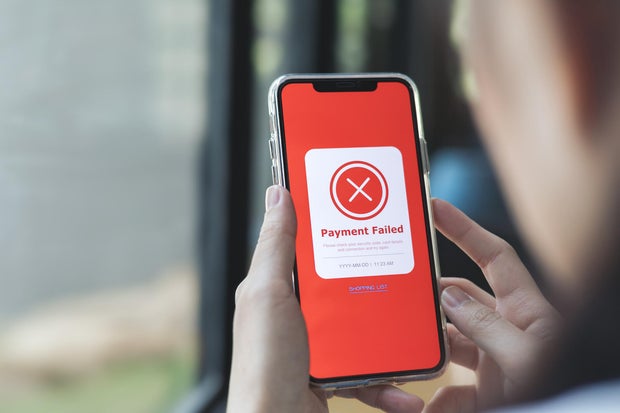 With debt becoming harder to manage, borrowers may want to take steps to avoid slipping into delinquency.
Midnight Studio/Getty Images
With debt becoming harder to manage, borrowers may want to take steps to avoid slipping into delinquency.
Midnight Studio/Getty Images
Amid today's tough economic landscape, the financial stability that once seemed unshakeable among America's most creditworthy borrowers is now showing cracks. A new report from VantageScore shows that even those borrowers with credit scores between 781 and 850 — the "superprime" category — are experiencing an uptick in delinquent payments. Last month, for example, there was a staggering 300% spike in superprime borrower delinquencies of 90 to 119 days past due, according to the report. While these delinquency levels remain extremely low overall, the dramatic uptick signals that debt repayment pressures have spread far beyond traditionally vulnerable borrower segments.
This unprecedented shift comes as credit card balances sit at an average of $6,500, per VantageScore's data, and as credit utilization rates hover near 31%, both of which indicate heightened reliance on revolving credit. And, credit card debt isn't the only issue that's compounding, either. Per the report, unsecured loan originations are also outpacing secured lending as borrowers scramble for liquidity through refinancing. In other words, it's clear that many households, including those once considered nearly immune to this type of economic pressure, are struggling to stay on track with their finances.
If you're one of the many struggling under the weight of the current economic climate, you may be looking for solutions to your debt problems. Luckily, there are easily accessible strategies you can use to avoid missing your debt payments and keep your credit score intact.
Find out more about the debt help that's available to you today.
How to avoid missing debt payments now
With debt becoming harder to manage, the question isn't just who is struggling; it's also about what borrowers can do to stay current and avoid slipping into delinquency. Here are some of the strategies you can use to get ahead before late payments begin to damage your credit score and limit your options:
Consolidate high-rate debt strategically
One of the most effective ways to simplify the repayment process and make it more affordable overall is through debt consolidation. By combining multiple credit card or loan balances into a single loan, you can often lock in a lower interest rate and reduce the number of bills you're juggling each month. This strategy can free up cash flow, making it easier to keep up with payments while lowering the long-term cost of debt.
Explore your debt relief options and chat with an expert now.
Enroll in a debt management plan
If debt consolidation isn't a feasible route to take, a credit counseling agency may be able to set you up with a debt management plan. These programs help make your debt more affordable by working with your creditors to try and reduce your interest rates and fees. They also help you establish a structured repayment schedule, which typically lasts between three to five years. You'll make one monthly payment to the credit counseling agency, which then distributes funds to your creditors. For many, this approach is a practical way to avoid missed payments while paying down balances.
Leverage professional financial guidance
Sometimes the hardest part is knowing where to start in terms of tackling your debt. That's where credit counselors can come in, even if you aren't planning to enroll in a debt management program. These professionals can help you weigh the pros and cons of each debt relief strategy, create a budget tailored to your situation and identify programs or products that fit your needs. For borrowers at risk of falling behind, even one session with a credit counselor can provide clarity and confidence about next steps.
Communicate proactively with your lenders
If you anticipate difficulty making payments, contact your lenders now, before you fall behind on what's owed. Many creditors offer temporary forbearance, payment modifications or hardship programs that can provide breathing room while you stabilize your finances. However, you're more likely to be approved for this type of help if you're proactive about the issue.
Use balance transfer offers wisely
For those with credit that's still intact, using a balance transfer card can provide temporary breathing room. The benefit of using a balance transfer card to tackle your debt is that these cards often come with a 0% introductory APR period that lasts anywhere from 12 to 21 months on average. So, by moving multiple high-rate credit card debts to this type of card, you can wipe out interest charges temporarily and make it more affordable to pay off what's owed, helping you stay on top of your debts. These tools aren't a cure-all, of course, but they can buy valuable time to pay down debt more effectively before delinquencies occur.
The bottom line
The current wave of payment difficulties that's affecting even superprime borrowers represents a fundamental shift in the credit landscape, driven by persistent economic pressures that transcend traditional risk categories. While the absolute levels of delinquencies among the most creditworthy consumers remain low, the spike in late payments serves as an early warning signal that proactive debt management is more critical than ever. By implementing strategic approaches, though, whether it's debt consolidation, professional guidance or maintaining open communication with lenders, borrowers can better navigate these challenging conditions while protecting their long-term financial health.
Angelica Leicht is the senior editor for the Managing Your Money section for CBSNews.com, where she writes and edits articles on a range of personal finance topics. Angelica previously held editing roles at The Simple Dollar, Interest, HousingWire and other financial publications.


















































